People are being forced to step up and fight to save the nation against a media monopoly, the so-called “media monster” that could significantly jeopardize Taiwan’s precious democracy and freedom of speech.
Students at universities like National Cheng Kung University (NCKU) and Kun Shan University (KSU) are urging students at universities in southern Taiwan to stand up and voice their opposition to media monopolization. They hope young people will show concern for matters of significant import and come together to bring about change.
NCKU’s 02 Group, whose name is a phonetic translation of “protest” in Hoklo (commonly known as Taiwanese), the Student Union and the United League of Student Unions all gathered at the main gate of the university’s Kuangfu campus to hold a soapbox event to speak out against media monopolization. Members and representatives of every student organization were invited to hold discussions. A student band named Stethoscope performed a song, “Behemoth,” that was written especially for the event, and at the end everyone came together for a group photo commemorating the anti-media monopoly event.
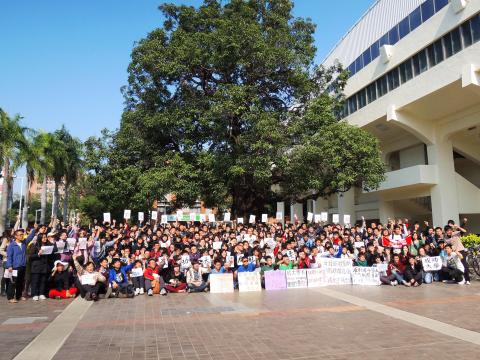
Photo: Meng Ching-tzu, Liberty Times
照片:自由時報記者孟慶慈
Chang Chih-ling, a member of 02 Group, says that people are not willing to let the media become a tool of those with power and authority, and will not allow the truth to be buried by single voice, so that is why they are fighting against the “media monster,” because it would blind Taiwanese from seeing their future. The students hope that by taking action the government will finally start taking the issue seriously, and they have four requests: the government should stop playing dead and seriously review the Next Media Group buyout merger; legislation against media monopolization must be passed; the government must voice opposition to Chinese interference; and the government must strive to protect freedom of the press and publicly support Taiwan’s Next Media unions.
Students from KSU’s Department of Public Relations and Advertising also organized an event — “Anti-media monopoly, I’m protecting Taiwan at KSU” — on Facebook, during which students and teachers were invited to gather in front of the school’s Library and Information Center at noon daily from Dec. 10 to Dec. 14, to offer their opinions and participate in a group photo activity in which individual cards were held up that spelled out in Chinese, “Anti-media monopoly, defending freedom of the press. I’m protecting Taiwan at KSU.”
(Liberty Times, Translated by Kyle Jeffcoat)
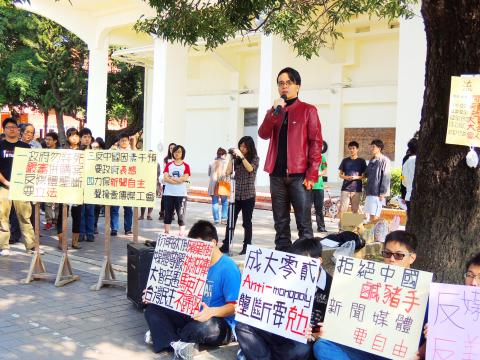
Photo: Meng Ching-tzu, Liberty Times
照片:自由時報記者孟慶慈
媒體巨獸將危及台灣珍貴的民主和言論自由,反媒體壟斷,自己的國家自己救!
成大、崑山科大等學生發起反對媒體壟斷活動,號召身處南台灣的大學生、青年人站出來發聲,關心該關心的大事,加入更多改變的力量。
成大零貳社、學生會、社聯會等社團,十二月十一日中午在成大光復校區大門口,針對反媒體壟斷議題舉行「校園肥皂箱」活動,邀請各社團學生或代表,共同宣導議題,學生樂團「白袍與聽診器」的發表「巨獸」創作,大家在光復校區擺攤,提供反媒體壟斷照片拍攝集氣。
零貳社成員張芷菱表示,大家不願意媒體成為權力者的工具,更不願真相被蒙蔽到僅剩一種聲音,因此要反對媒體巨獸,它會盲目了台灣的未來;學生希望藉由實際行動,監督政府重視此一議題,也提出四大訴求,一、政府不要裝死,要嚴審併購案。二、反媒體壟斷,要立法。三、反中國因素干預,要政府表態。四、力保新聞自主,聲援壹傳媒工會。
崑山科大公共關係暨廣告系學生則在臉書發起「反對媒體壟斷,我在崑山科技大學守護台灣」活動,邀師生十二月十日至十四日到圖書資訊館前,參與現「生」說法,讓我們一起發「聲」照片串聯活動,與「反對媒體壟斷.捍衛新聞自由.我在崑山科技大學守護台灣」字卡合照表達立場。
(自由時報記者孟慶慈)
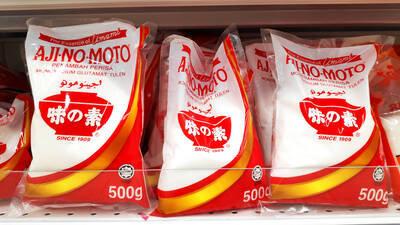
Monosodium glutamate (MSG) has been used in cooking for over a century to enhance flavor. It is often found in Chinese dishes and many other cuisines. Despite its common use, many people misunderstand the safety of MSG. The bad __1__ of MSG started in the late 1960s, when a letter to the New England Journal of Medicine described symptoms like a racing heart, weakness, and numbness after the writer ate Northern Chinese food. While no specific cause was __2__, a series of questionable studies in 1968 began to point the finger at MSG. In one such study, neurologist Herbert Schaumburg and
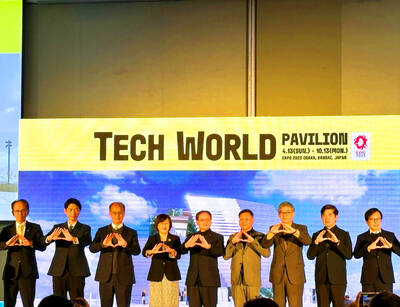
A: The World Expo 2025 is about to open in Osaka. Is Taiwan going to participate in the event too? B: Sure, the Taiwan External Trade Development Council (TAITRA) will launch a Taiwan pavilion named “Tech World.” A: That sounds cool, and it can showcase our national strength in technology. B: The theme is “Connecting the world to create better future lives together.” The pavilion aims to attract over one million visitors. A: I hope humans can really create better future lives through this year’s fair. A: 2025年世博會即將開幕,這次台灣也會參加嗎? B: 當然啦,外貿協會的台灣館將以「Tech World」名義參展! A: 聽起來蠻酷的,應該是想強調台灣的科技實力。 B: 策展主題則是:「連結世界,共創未來美好生活」,希望能吸引到100萬人次參訪。 A: 希望藉由這次世博會,人類真的能共創美好生活。 (By Eddy Chang, Taipei Times/台北時報張迪)
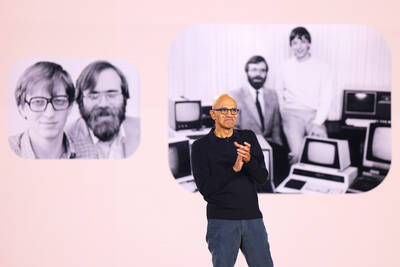
Even as he grows older, Microsoft founder Bill Gates still fondly remembers the catalytic computer code he wrote 50 years ago that opened up a new frontier in technology. Although the code that Gates printed out on a teletype machine may look crude compared to what’s powering today’s artificial intelligence platforms, it played a critical role in creating Microsoft in April 1975 — a golden anniversary that the Redmond, Washington, company celebrated on April 4. Gates, 69, set the stage for that jubilee with a blog post reminiscing on how he and his old high school friend — the late Paul Allen

The study had several issues. Small sample sizes made it hard to draw __7__ conclusions. Additionally, taking a __8__ like pure MSG on an empty stomach is likely to make a person ill in any case. Choosing individuals who already had a history of the symptoms could have created a bias because they were likely to __9__ the reactions again. When real scientific research on the effects of MSG was eventually done, many of the myths surrounding it were proven __10__. The U.S. Food and Drug Administration and other global organizations have found MSG safe to eat. Today, MSG